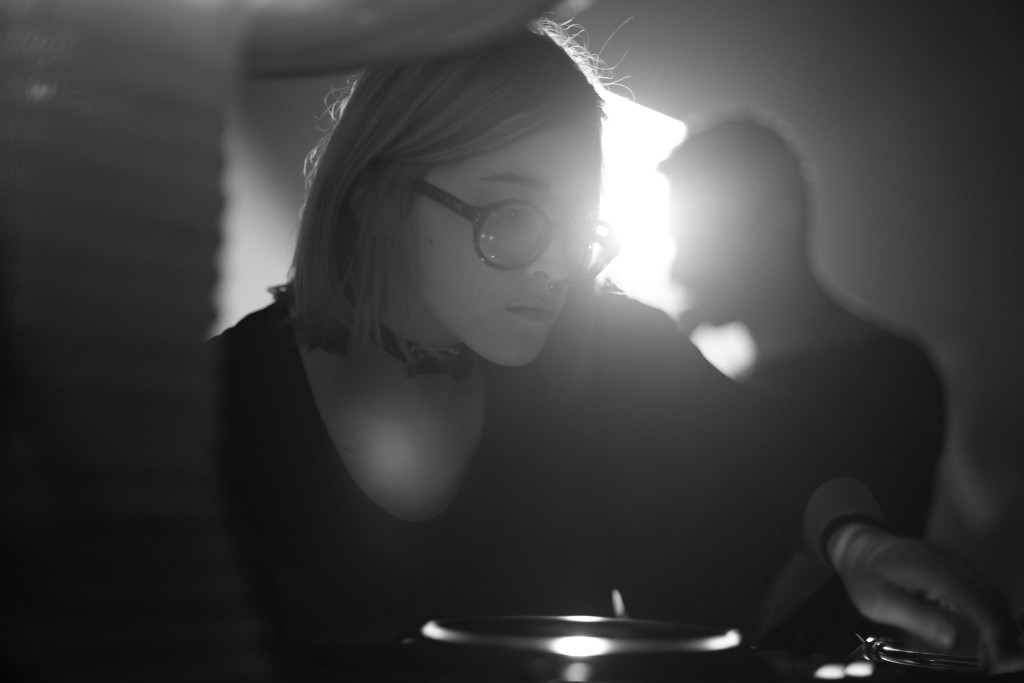Chlorys is a DJ, visual artist and soon-to-be-cyborg based in Bucharest. After only one year of trekking through the murky & engulfing waters of electronic music, Chlorys became a member of the Queer Night DJ family. During this relatively short time span, she has played alongside Lena Willikens, Borusiade, Khidja, Holy Fix, Utopus, L-Vis 1990 etc. and was part of the Rokolectiv Festival 2016 roster. Her music selection spans electronica, disco, minimal and beyond. She situates herself (or not) everywhere in-between or outside of the genre-formula, letting herself be seized by the limbo currents into undisclosed territories.
Your background is in visual arts and music. Can you talk about it?
To be frank – academically speaking – my musical background is close to 0, but I tend to find that extremely stimulating in a sense that it provides me with endless paths that can be undertaken. I believe in professional amateurship, if you may. I’m still trying to develop a mechanism that might enable me to fuse them in some sort of composite between the visual and the musical. I think Lena Willikens is trying to do something similar with her Phantom Kino Ballet.
Can you talk about your sonic aesthetic and how you craft it? Your mixes have a special atmosphere: mysterious, eerie, hypnotic.
I often spend time questioning why I choose to play certain sounds and what’s the mechanism behind them that immediately draws my attention. I usually play tracks that have a supernatural feel to them, while also trying to convey a more fleshy taste.
Can you talk about the Queer Night event and your involvement in it?
Queer Night is the lovechild of Cosima Opârtan, Ion Dumitrescu (both in Raze de Soare) & Paul Dunca. It came to fruition out of the very urgent need to establish a more coagulated LGBTQIA+ scene here in Bucharest. It aims to provide a sense and place of empowerment for all the outcasts, while parasiting on/hacking various venues around town, one of them being the Guesthouse, a temple of the minimal scene, which sometimes nests misogynistic and homo-antagonistic discourses. My debut gig actually took place at a Queer Night and it provided me with enough exposure to get noticed. I regularly play at their parties, which I find the closest to my inner realms.
“Chlorys emphasizes a multi and interdisciplinary approach to music and is concerned about its socio-political context.” Can you explain? Is politics and a wider socio-political aspect important to your work?
Music has always been political, especially club music. I feel a strong urge to pay respect to that. Our Corp project is an immediate and necessary reaction to that. Especially in a devoutly Christian environment, it’s imperative that we foster awareness when it comes to feminist and queer issues.
Can you talk about the electronic music scene in Bucharest?
The underground electronic scene is pretty alienating and divided. On the one hand we have the (in)famous sacrosanct minimal scene, and on the other, the rest of the electronic topographies, be it house, techno, experimental etc. They scarcely draw the same crowd with a broad understanding of the complexities of music. Paradoxically, that palpable gap renders a nurturing environment for new discourse and ventures.
You are part of corp, a new collective for female musicians and performers. Can you talk about this initiative?
corp. is a project, a platform and a booking agency which encompasses musical and visual endeavours. It aims to represent and showcase female-identified DJ talent in electronic music, while also being dedicated to acquiring and exposing obscure sights and sounds, spanning experimental and traditional forms, from the centre, the netherworld and beyond. The project’s main, urgent drive is to open and sustain a studio where women will have the luxury of a space and time which would help them to further develop their skills.
We’re also focusing on developing a go-to accessible archive for podcasts made by female DJs. We already have a mix from Nene Hatun, Borusiade and others will soon follow.
